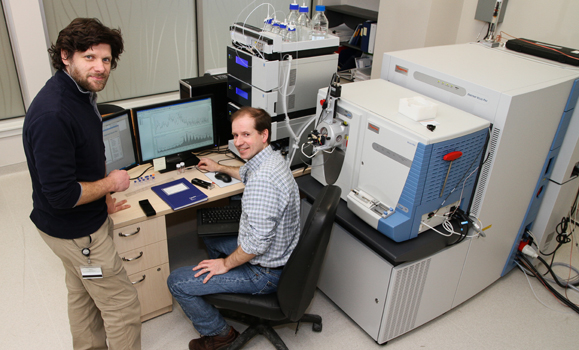Molly Appeal to help fund Orbitrap Fusion, boosting cancer, brain, immunity research
» Go to news main
Molly Appeal to help fund Orbitrap Fusion, boosting cancer, brain, immunity research

Dalhousie University will soon be home to Atlantic Canada’s only Orbitrap Fusion mass spectrometer, a powerful research instrument that will allow researchers to explore new territory in their search for cures for cancer, infectious diseases, autoimmune disorders, neurodegenerative diseases, psychiatric illnesses and many more deadly and debilitating conditions.
Maritimers can help by donating to Dalhousie Medical Research Foundation’s 2019 fall Molly Appeal, which aims to raise $250,000 in cornerstone funds for the $1.3 million machine. Federal and provincial government agencies, Dalhousie’s Faculty of Medicine and Dalhousie Medical Research Foundation will supply the rest of the necessary funds.
Researchers like Dr. Shashi Gujar will use the Orbitrap Fusion to analyze proteins and metabolites inside cells, rapidly and with 50 to 100 times greater sensitivity and detail than current equipment allows.
“The new Orbitrap Fusion features all the latest advances in mass spectrometry and will accelerate research in all areas of Dalhousie’s Faculty of Medicine, the university at large, and even eastern Canada,” says Dr. Gujar, an assistant professor in the departments of Pathology and Microbiology & Immunology.
Cancer immunotherapy
Dr. Gujar is gaining international attention for his efforts to fight cancer with such strategies as cancer-killing viruses and light-activated ruthenium compounds that “flag” cancer cells so the immune system can see and then kill them. And since the Orbitrap Fusion mass spectrometer is equipped to identify and measure the by-products of metabolism inside cells, it will allow him to pursue his world-leading efforts to find the best ways of starving cancer cells.
“Cancer requires a lot of fuel to sustain its growth,” says Dr. Gujar. “We are the first to discover that manipulating the metabolism of cancer — for example, by inhibiting enzymes that fuel cancer growth — makes cancers highly susceptible to destruction by cancer-killing viruses and other therapies. The Orbitrap Fusion is essential to our progress in this work.”

Dr. Alejandro Cohen and Dr. James Fawcett will make extensive use of the Orbitrap Fusion, which will replace the mass spectrometer—based on 20-year-old technology—shown here. (Photo courtesy Dalhousie Medical School)
Personalized medicine
The ability to see what metabolites are present in blood and tissue samples opens the door to new ways of diagnosing illness and predicting a patient’s response to treatment, according to Dr. James Fawcett, a professor in the departments of Pharmacology and Surgery and an expert in mass spectrometry. As he notes, “It provides a whole new way to develop treatments that can be personalized to the specific needs of individual patients.”
Dr. Fawcett will use the Orbitrap Fusion in his work to understand the genetic mutations that lead to psychiatric disorders, such as schizophrenia and bipolar disorder. “Genetic mutations lead to structural and functional defects in the proteins that are important for synaptic connections within the brain,” he explains. “The new equipment will allow us to understand how bipolar disorder and schizophrenia develop and to identify and test potential new therapies for these devastating mental illnesses.”
At the same time, Dr. Fawcett is working with colleagues in Dalhousie’s Faculty of Medicine to explore potential new immune therapies for cancer. For example, he and Dr. Carman Giacomantonio are investigating immunotherapies for skin cancers, while he and Dr. Adrienne Weeks are exploring potential immune therapies for glioblastoma, a deadly form of brain cancer.
“Mass spectrometry is a powerful tool we use to identify complexes of proteins that work together and how they can change in diseases,” Dr. Fawcett says. “Mass spectrometry is a powerful tool for understanding illness, designing drugs, diagnosing disease, fine-tuning a treatment plan, and monitoring response to treatment.”
Accelerated regional progress
The Orbitrap Fusion mass spectrometer will replace aging equipment based on 20-year-old technology. More than 60 research groups at Dalhousie University and across the region have made use of the old equipment since 2015. Many projects will move forward, and faster, with the addition of the Orbitrap Fusion and the new capabilities it will bring.
The new equipment will be housed in the Dalhousie University Faculty of Medicine Mass Spectrometry and Proteomics Core Facility, maintained and operated by trained experts and accessible to researchers around the clock, so they can accelerate their efforts to find cures. The instrument will also enhance the research training environment for the broader community and promote collaborations with industry and government researchers in Atlantic Canada.
For more information and to give to the Molly Appeal, visit mollyappeal.ca
